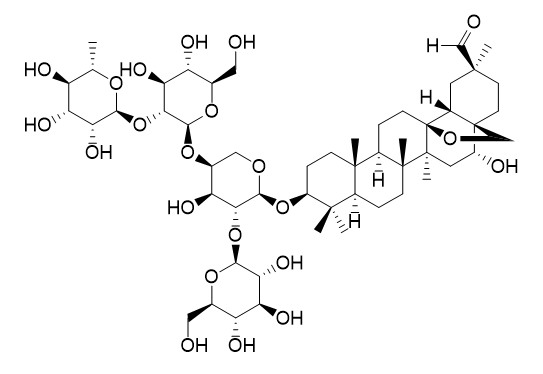Ardisiacrispin B
Ardisiacrispin B displays cytotoxic effects in multi-factorial drug resistant cancer cells via ferroptotic and apoptotic cell death.
Inquire / Order:
manager@chemfaces.com
Technical Inquiries:
service@chemfaces.com
Tel:
+86-27-84237783
Fax:
+86-27-84254680
Address:
1 Building, No. 83, CheCheng Rd., Wuhan Economic and Technological Development Zone, Wuhan, Hubei 430056, PRC
Providing storage is as stated on the product vial and the vial is kept tightly sealed, the product can be stored for up to
24 months(2-8C).
Wherever possible, you should prepare and use solutions on the same day. However, if you need to make up stock solutions in advance, we recommend that you store the solution as aliquots in tightly sealed vials at -20C. Generally, these will be useable for up to two weeks. Before use, and prior to opening the vial we recommend that you allow your product to equilibrate to room temperature for at least 1 hour.
Need more advice on solubility, usage and handling? Please email to: service@chemfaces.com
The packaging of the product may have turned upside down during transportation, resulting in the natural compounds adhering to the neck or cap of the vial. take the vial out of its packaging and gently shake to let the compounds fall to the bottom of the vial. for liquid products, centrifuge at 200-500 RPM to gather the liquid at the bottom of the vial. try to avoid loss or contamination during handling.
Molecules.2019, 24(2):E343
Anesth Pain Med (Seoul).2020, 15(4):478-485.
Separation Science Plus2022, sscp.202200048.
Biomolecules.2024, 14(4):451.
Phytochemistry Letters2017, 449-455
Sci Rep.2021, 11(1):14180.
Sci Rep.2020, 10:4495(2020)
Dental Journal2024, 57(4): 254-258
Front Aging Neurosci.2019, 11:230
Horticulturae2020, 6(4),76.
Related and Featured Products
Phytomedicine. 2018 Apr 1;43:78-85.
A naturally occuring triterpene saponin ardisiacrispin B displayed cytotoxic effects in multi-factorial drug resistant cancer cells via ferroptotic and apoptotic cell death.[Pubmed:
29747757 ]
Multidrug resistance of cancer cells constitutes a serious problem in chemotherapy and a challenging issue in the discovery of new cytotoxic drugs. Many saponins are known to display anti-cancer effects. In this study, the cytotoxicity and the modes of action of a naturally occuring oleanane-type tritepene saponin, Ardisiacrispin B isolated from the fruit of Ardisia kivuensis Taton (Myrsinaceae) was evaluated on a panel of 9 cancer cell lines including various sensitive and drug-resistant phenotypes.
METHODS AND RESULTS:
Resazurin reduction assay was used to evaluate cytotoxicity and ferroptotic cell death of samples; caspase-Glo assay was used to detect the activation of caspases in CCRF-CEM leukemia cells. Flow cytometry was used for cell cycle analysis and detection of apoptotic cells by annexin V/PI staining, analysis of mitochondrial membrane potential (MMP) and measurement of reactive oxygen species (ROS).
Ardisiacrispin B displayed significant cytotoxic effects in the 9 tested cancer cell lines with IC50 values below 10 µM. The IC50 values ranges were 1.20 µM (towards leukemia CCRF-CEM cells) to 6.76 µM [against heptocarcinoma HepG2 cells] for Ardisiacrispin B and 0.02 µM (against CCRF-CEM cells) to 122.96 µM (against resistant CEM/ADR5000 leukemia cells) for doxorubicin. Collateral sensitivity of resistant HCT116p53-/- colon adenocarcinoma cells to ardisiacripsin B was observed. Ardisiacrispin B induced apoptosis in CCRF-CEM cells via activation of inititator caspases 8 and 9 and effector caspase 3/7, alteration of MMP and increase in ROS production. Ferroptosis also contributed to the cytotoxicity of Ardisiacrispin B.
CONCLUSIONS:
The studied oleanane-type triterpene saponin is a good cytotoxic molecule that deserve more detailed exploration in the future, to develop novel cytotoxic drugs to combat both sensitive and drug-resistant cancers.
Phytochemistry. 1994 Nov;37(5):1389-96.
Triterpenoid saponins from Ardisia crenata.[Pubmed:
7765756 ]
METHODS AND RESULTS:
Two novel triterpenoid saponins, ardisicrenoside A [3 beta-O-(alpha-L-rhamnopyranosyl-(1-->2)-[beta-D-glucopyranosyl- (1-->4)-[beta-D-glucopyranosyl-(1-->2)]-alpha-L-arabinopyranosyl)- 13 beta,28-epoxy-16 alpha,30-oleananediol] and ardisicrenoside B [3 beta-O-(beta-D-xylopyranosyl-(1-->2)-[beta-D- glucopyranosyl-(1-->4)-[beta-D-glucopyranosyl-(1-->2)]- alpha-L-arabinopyranosyl)-13 beta,28-epoxy-16 alpha,30-oleananediol] were isolated from the roots of Ardisia crenata. Two known triterpenoid saponins, ardisiacrispins A and B were also isolated from this source. Their structures were determined mainly by 2D NMR (COSY, HOHAHA, HETCOR, HMBC and ROESY) experiments.
CONCLUSIONS:
The aglycones are the new 13 beta,28-epoxy-3 beta,16 alpha,30-oleananetriol for ardisicrenoside A and ardisicrenoside B.



